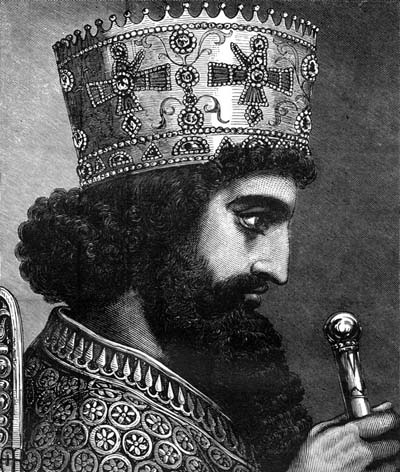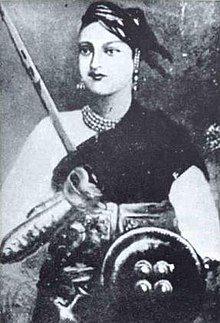Artemisia really pissed off the Athenians. Why? Because she led attacks against Athens, and won. How much did the Athenians hate Artemisia? Ten thousand drachmas worth of hatred. That's about a quarter million US dollars in today's currency.
Artemisia was the queen of Caria, a region in the north of today's modern Turkey. Like many ancient queens before her, Artemisia was never meant to rule. She became queen when her husband died, and her son was too young to rule. She took to her role of queen regnant like a fish to water. She took advantage of the Carians previous alliance with the Persians to do a little conquering
It was 480 BCE, and King Xerxes of Persia was going after the Greek city states, specifically Athens. Artemisia gathered a fleet, and sailed out to help him. When she got there she joined King Xerxes' war council, where she became one of his most trusted and valued advisers.
Artemisia is well known for two really big moments in this war, and after that she more or less disappears from history. The reason we know about her at all is because of her #1 fan, Herodotus, who wrote so much about her in his record of the battle of Salamis (one of the two really big moments), that he's been accused of leaving out important parts of that battle, because he was too busy fangirling over Artemisia. Honestly though? #relateable. After reading about her, I'm fangirling too.
Why? You ask. What are these big moments? You demand. Why the hell haven't you gotten on with telling us what she actually did? You further inquire. I was looking for a good transition okay, shut up, I'll give you what you want.
Artemisia I's two big moments both came during this invasion of Greece. Though she was named after Artemis, she should have been named after Athene, because she demonstrated both great wisdom, and great skill in battle.
 |
| Our girl |
It was 480 BCE, and King Xerxes of Persia was going after the Greek city states, specifically Athens. Artemisia gathered a fleet, and sailed out to help him. When she got there she joined King Xerxes' war council, where she became one of his most trusted and valued advisers.
Artemisia is well known for two really big moments in this war, and after that she more or less disappears from history. The reason we know about her at all is because of her #1 fan, Herodotus, who wrote so much about her in his record of the battle of Salamis (one of the two really big moments), that he's been accused of leaving out important parts of that battle, because he was too busy fangirling over Artemisia. Honestly though? #relateable. After reading about her, I'm fangirling too.
Why? You ask. What are these big moments? You demand. Why the hell haven't you gotten on with telling us what she actually did? You further inquire. I was looking for a good transition okay, shut up, I'll give you what you want.
Artemisia I's two big moments both came during this invasion of Greece. Though she was named after Artemis, she should have been named after Athene, because she demonstrated both great wisdom, and great skill in battle.
 |
| King Xerxes |
- So our bud Xerxes had destroyed Athens, and he was trying to figure out if he wanted to go for the rest of Greece, or nah. Partially as a test of his advisers, and partially because he was indecisive, Xerxes had his buddy, Mardonius, go around to each of his advisers, and ask them what they thought he should do, should he engage the Greeks in a naval battle, or pull back. All of Xerxes' advisers told him he should engage the Greeks in naval battle, except for Artemisia, who pointed out that the Greeks had a better navy than the Persians, and that it would be a much better strategy to simply starve the Greeks into submission. Everyone thought she would be executed for cowardice, boy were they surprised when Xerxes conceded that she was right. However, Xerxes also decreed that majority ruled, and proceeded to start the battle of Salamis.
- The Battle of Salamis was a naval engagement between the Persians and the Greeks, and, as Artemisia predicted, it wasn't going so well for the Persians, because, as might be expected for a nation made up entirely of small islands, the Greeks had a damn good navy. Despite the fact that her advice had been blatantly ignored, Artemisia brought her men to the party anyways. Things were proceeding as normal, men falling overboard, ships going up in flames, utter carnage as per usual, when Artemisia found herself caught between the advancing Greek forces, and the ships of her Persian allies. There was no escape, and it might have been the end for her, except for the fact that she had the foresight to have a greek flag in her hold as well as a Persian one. She had her men take down the Persian colors, and hoist the Greek ones. Then, to make sure the Greeks really thought she was one of them, she attacked the ships of the nation of Calynda, a fellow Persian ally whose king, Damasithymus, Artemisia particularly disliked. The Greeks were deceived, convinced that she was either a Greek or a Persian defector. Artemisia made it out of the battle alive, and though Damasithymus was upset, Xerxes thought she was brilliant, and honored her by having her take his two sons to Ephesus, because nothing says thank you quite like a royal order to babysit.
 |
| Artemisia |
Following this, Artemisia isn't mentioned again. She passed out the rest of her life if not in peace, then not in particularly memorable unrest. Presumably, her son became king after her, though there is no record of his reign, just as there is no record of Artemisia's husband.
It should be noted that some of the deeds of Artemisia II are sometimes assigned to Artemisia I. It is generally agreed upon that Artemisia I's fame ends here, and Artemisia II has her own set of illustrious accomplishments.
Sources





